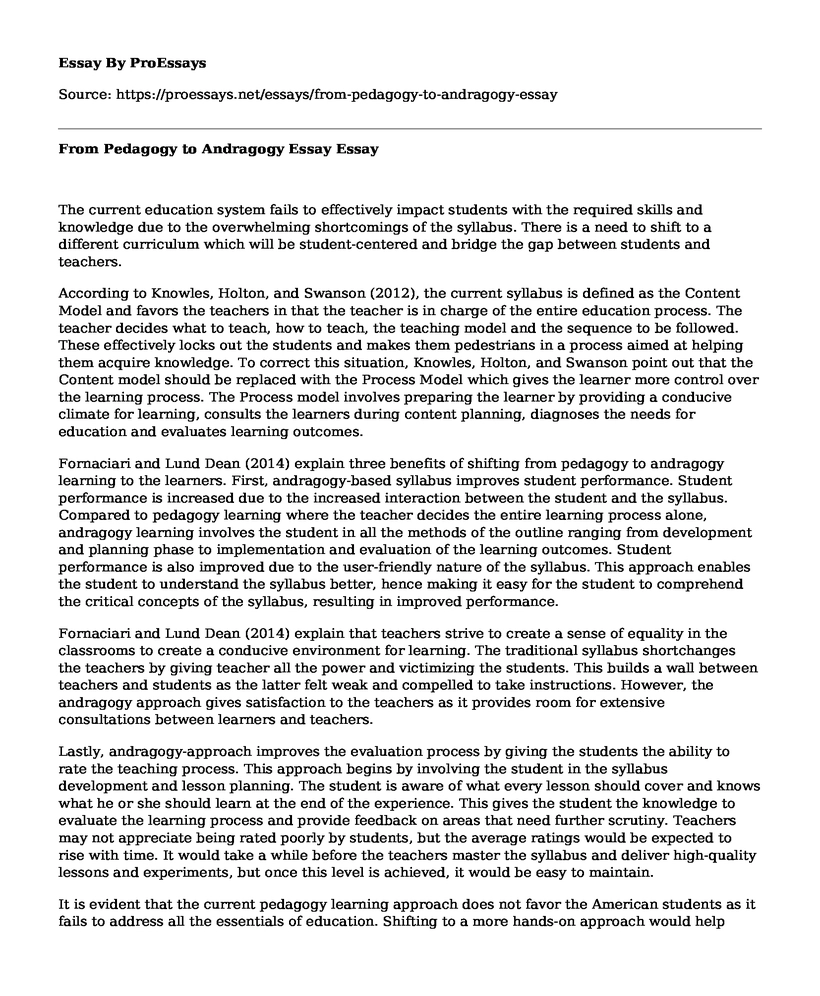The current education system fails to effectively impact students with the required skills and knowledge due to the overwhelming shortcomings of the syllabus. There is a need to shift to a different curriculum which will be student-centered and bridge the gap between students and teachers.
According to Knowles, Holton, and Swanson (2012), the current syllabus is defined as the Content Model and favors the teachers in that the teacher is in charge of the entire education process. The teacher decides what to teach, how to teach, the teaching model and the sequence to be followed. These effectively locks out the students and makes them pedestrians in a process aimed at helping them acquire knowledge. To correct this situation, Knowles, Holton, and Swanson point out that the Content model should be replaced with the Process Model which gives the learner more control over the learning process. The Process model involves preparing the learner by providing a conducive climate for learning, consults the learners during content planning, diagnoses the needs for education and evaluates learning outcomes.
Fornaciari and Lund Dean (2014) explain three benefits of shifting from pedagogy to andragogy learning to the learners. First, andragogy-based syllabus improves student performance. Student performance is increased due to the increased interaction between the student and the syllabus. Compared to pedagogy learning where the teacher decides the entire learning process alone, andragogy learning involves the student in all the methods of the outline ranging from development and planning phase to implementation and evaluation of the learning outcomes. Student performance is also improved due to the user-friendly nature of the syllabus. This approach enables the student to understand the syllabus better, hence making it easy for the student to comprehend the critical concepts of the syllabus, resulting in improved performance.
Fornaciari and Lund Dean (2014) explain that teachers strive to create a sense of equality in the classrooms to create a conducive environment for learning. The traditional syllabus shortchanges the teachers by giving teacher all the power and victimizing the students. This builds a wall between teachers and students as the latter felt weak and compelled to take instructions. However, the andragogy approach gives satisfaction to the teachers as it provides room for extensive consultations between learners and teachers.
Lastly, andragogy-approach improves the evaluation process by giving the students the ability to rate the teaching process. This approach begins by involving the student in the syllabus development and lesson planning. The student is aware of what every lesson should cover and knows what he or she should learn at the end of the experience. This gives the student the knowledge to evaluate the learning process and provide feedback on areas that need further scrutiny. Teachers may not appreciate being rated poorly by students, but the average ratings would be expected to rise with time. It would take a while before the teachers master the syllabus and deliver high-quality lessons and experiments, but once this level is achieved, it would be easy to maintain.
It is evident that the current pedagogy learning approach does not favor the American students as it fails to address all the essentials of education. Shifting to a more hands-on approach would help improve the education standards, improve student performance and achieve the goals of education. Andragogy learning gives both the teachers and the students the satisfaction needed to stimulate improvements.
References
Fornaciari, C. J., & Lund Dean, K. (2014). The 21st-century syllabus: From pedagogy to andragogy. Journal of Management Education, 38(5), 701-723.
Knowles, M. S., Holton III, E. F., & Swanson, R. A. (2012). The adult learner. Routledge.
Cite this page
From Pedagogy to Andragogy Essay. (2022, Sep 22). Retrieved from https://proessays.net/essays/from-pedagogy-to-andragogy-essay
If you are the original author of this essay and no longer wish to have it published on the ProEssays website, please click below to request its removal:
- Psychology Paper Sample on Children's Cognitive Development
- Online Classes vs Conventional Classroom: Pros & Cons
- Essay Sample on Teaching Social Skills to Improve Education and Parenting
- Essay Sample on Public Schools: Houston's Decentralization & Centralization
- Essay Sample on School-Based Programs: Reducing Tooth Decay in Kids
- Talented Child: Outstanding Performance & Motor Skills - Essay Sample
- Statement of Purpose for Application for Combined Ph.D. Program - Free Paper







